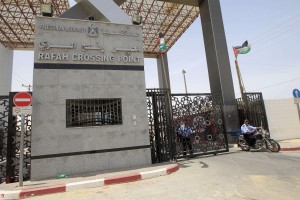
(AFP Photo)
Egyptian authorities partially opened the Rafah border crossing in both directions on Saturday for four hours, for humanitarian cases and foreign passport holders, Gaza based Ma’an news agency reported.
The border crossing, often described as a lifeline to the Gaza Strip, was shut down on Friday in both directions, coinciding with an Egyptian campaign to destroy underground tunnels connecting Egypt and the Gaza Strip.
Egyptian authorities have increased their security presence at the border since the onset of the worsening political crisis in Egypt. Two days after former president Mohamed Morsi was removed from power on 3 July, Egyptian authorities shut down the border crossing.
It remained shut until Tuesday 9 July and was reopened for four hours Wednesday to coincide with the first day of Ramadan.
The United Nations Office for Coordination of Humanitarian Affairs (OCHA) said around 1,500 people were able to cross from Egypt into Gaza and 325 were allowed inside Egypt, either because they hold foreign passports or for medical treatment, when the crossing was opened on Wednesday.
In its weekly report for 2 to 8 July, OCHA said 3,000 people who were attempting to enter Gaza through Egypt had been affected by the closure. It added that in four days of closure, medical treatment to hundreds was delayed.
The border crossing is used by those seeking to enter and leave the strip but also to transport donated medication to the strip. The report said the closure of the crossing is “undermining already reduced stocks.”
Regarding the underground tunnels, OCHA said Egyptian authorities have destroyed 25 tunnels and estimates that no more than 10 tunnels remain. “The tunnels have become the main channel for the supply to Gazan markets of building materials… and of fuels,” the report said.

